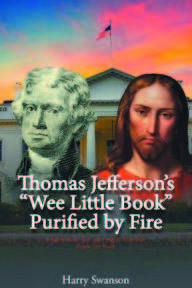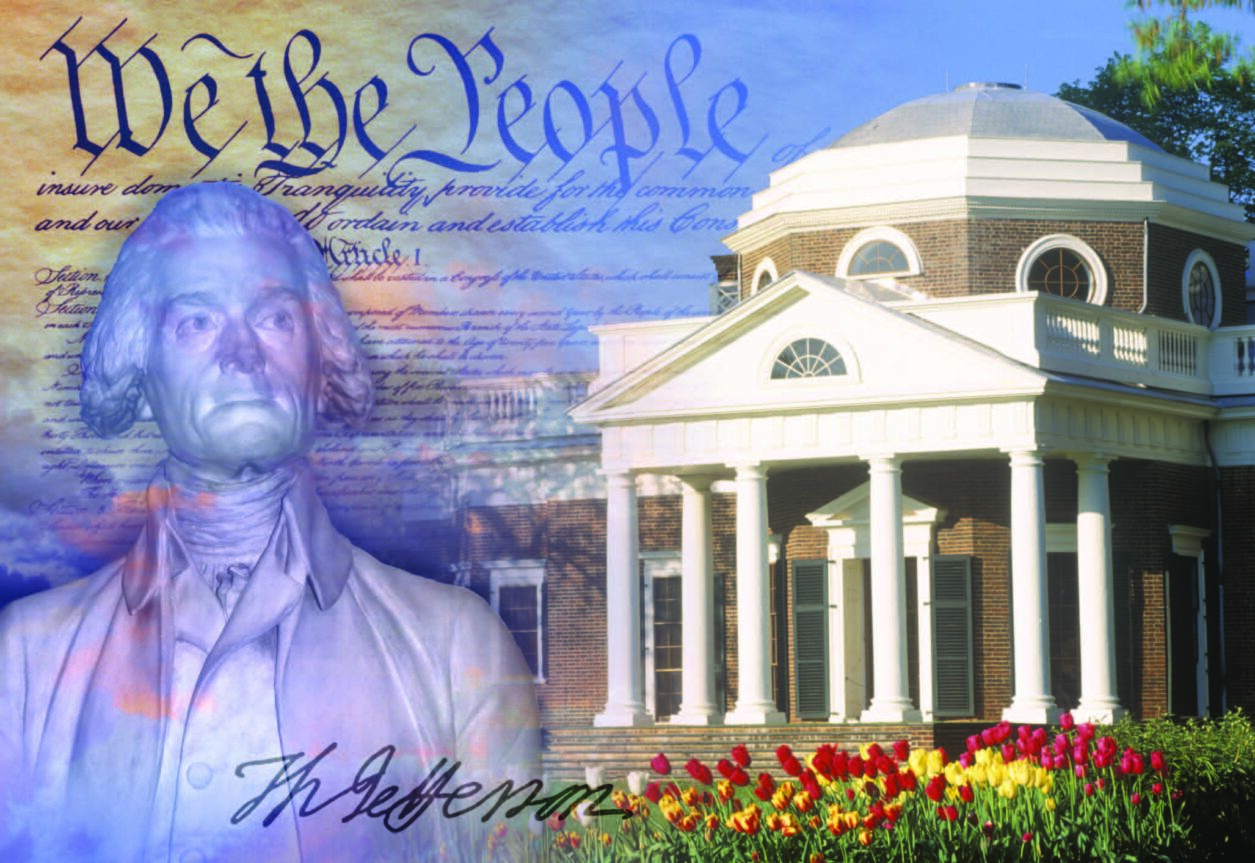We owe tremendous thanks to our Founding Fathers for the gifts of liberty that we enjoy today.
Thomas Jefferson is one of those Founders at the top of that list. Jefferson lived a fulfilled life being known for many professions and titles. He also served as a diplomat, lawyer, architect and could speak several languages.
He is probably most remembered as the principal author of the Declaration of Independence working on the “Committee of Five” along with John Adams, Benjamin Franklin, Robert Livingston and Roger Sherman. He served as the Governor of Virginia, Congressman, the first Secretary of State under George Washington, Vice President under John Adams and President of the United States from 1801-1809.
Jefferson being influenced by others, such as Patrick Henry, became devoted to the cause of American freedom and liberty. Jefferson worked his pen to see this newly formed nation would be like none other and that it was to be built on Christian values. He dedicated his life to establishing a governmental framework for his country based on the same Biblical principles. Jefferson understood the need for God’s wisdom and his role in developing a government that assured freedoms. While church and state are to be separate, they are still to be one.
Slavery and Debt
Jefferson would pursue reforms to slavery and took on several court cases for those slaves who were seeking freedom. He argued that all are born free with personal rights and liberty that are God given to all. As President he signed the congressional “Act of Prohibiting importation of Slaves”. However, Jefferson himself typically held about 200 slaves at his own home at Monticello with a combined total of 600 over his lifetime. The state of Virginia had tough pro-slavery laws that dated back as far as 1691, long before Jefferson’s birth. The state implemented significant economic hardships for most slave owners to have to overcome if they were considering emancipating their slaves. Today we can see Jefferson’s life of contradiction. However, we ourselves enjoy discounted products imported from China, India, and Pakistan, to mention a few, often made by slaves.
Declaration of Independence
Jefferson often studied the Bible and created laws in consideration of religious liberty. The greatest example is found in his drafting of the Declaration of Independence which was introduced to Congress on June 7th 1776. Jefferson was extremely proud of this accomplishment, much of which was influenced by the bible and his many consultations with John Adams, Benjamin Franklin, Robert Livingston and Roger Sherman. The document was formally declared on July 2nd with final draft approval on July 4th 1776. The Declaration says: “…the Representatives of the United States of America … … appealing to the Supreme Judge of the world for the rectitude of our intentions… … with a firm reliance on the protection of Divine Providence, we mutually pledge to each other our Lives, our Fortunes and our sacred Honor.” Thomas Jefferson wanted this document to reveal who we were as a people. We are a free people and this is who we are.
Religion and Government
Thomas Jefferson held a true reverence for the Creator and the Bible. He also seemed to have a fear of God but an even greater fear that this newly created American Government would endorse one central religion. He fought hard to see that government would never get between the freedom of the individual and their creator. Jefferson held a strong connection with his creator and the moral teachings found in the Bible. He wanted both government and church to flourish independent of one another. The politicians must stick with government affairs and the individual should have religious choice. In his mind religion was expected to prepare people for political office as it did for him, as found in the wording of The Declaration of Independence.
Secretary of State, Vice President, President
George Washington would call on Jefferson to serve as our nation’s first Secretary of State for both of his presidential terms of 1789 and 1793. In 1796 Jefferson ran for President but lost to John Adams. Jefferson would serve as Vice President under President John Adams 1797-1801. In 1801 Thomas Jefferson became the third President of the United States. Jefferson’s inauguration was the first held in Washington D C. He would still argue for religious freedom stating, “All persons shall have full and free liberty of religious opinion: nor shall any be compelled to frequent or maintain any religious institution.” Jefferson wanted to be sure that government and religion didn’t mix. Each was as important as the other. He said: “The rights of conscience we never submitted, we could not submit. We are answerable for them to our God.” Speaking to a friend he said: “Of all the systems of morality, ancient or modern, which have come under my observation, none appear to me so pure as that of Jesus.” Jefferson wanted the religious institutions to prepare people for government office. He said, “We are all in the obligation of the moral precepts of Jesus, and nowhere will they be found delivered in greater purity than his discourses.” Thomas Jefferson was the champion of liberty and religious liberty.
July 4th 1826
Jefferson died on July 4th 1826 on the 50th Anniversary of the signing of his Declaration of the Independence, which served as the forerunner of our U S Constitution. Just hours later his good friend John Adams died. To this day they are among our nation’s most brilliant minds. No question, Thomas Jefferson belongs on Mount Rushmore.
Excerpted and adapted from Thomas Jefferson’s Wee Little Book Purified by Fire, by Harry Swanson
 Harry Swanson is the author of Thomas Jefferson’s Wee Little Book Purified by Fire, and holds a Bachelors Degree in Accounting and a Master’s Degree in Business and Finance. Retired after 45 years, Harry’s work titles included Controller, Director of Finance and Administration, CFO and Financial Management Consultant for both large and small / profit and non-profit companies located throughout Long Island and New York City. He was brought up in the church and attended Sunday School under his mothers careful eye and Godly direction. Harry’s favorite sport has always been baseball and visits Cooperstown as often as possible. He has also authored Ruthless Baseball – Yankees Purified by Fire covering very difficult times for the New York Yankees franchise between the years of 1919 to 1923. Harry and his wife, Susan of 43 years have two grown married children and several grandchildren.
Harry Swanson is the author of Thomas Jefferson’s Wee Little Book Purified by Fire, and holds a Bachelors Degree in Accounting and a Master’s Degree in Business and Finance. Retired after 45 years, Harry’s work titles included Controller, Director of Finance and Administration, CFO and Financial Management Consultant for both large and small / profit and non-profit companies located throughout Long Island and New York City. He was brought up in the church and attended Sunday School under his mothers careful eye and Godly direction. Harry’s favorite sport has always been baseball and visits Cooperstown as often as possible. He has also authored Ruthless Baseball – Yankees Purified by Fire covering very difficult times for the New York Yankees franchise between the years of 1919 to 1923. Harry and his wife, Susan of 43 years have two grown married children and several grandchildren.




















